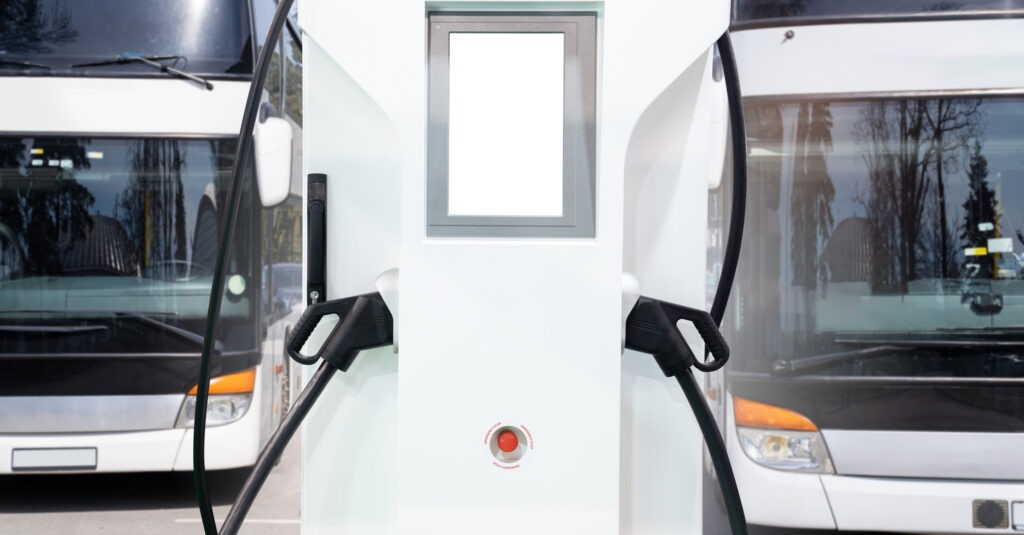Europe’s electric-bus market ended 2023 on a high, but has this growth continued into the first quarter of 2024? Przemek Kolasa, data manager for commercial vehicles at EV Volumes, examines the trends with Autovista24 special content editor Phil Curry.
Made up of full-electric and plug-in hybrid vehicles, Europe’s electric-bus market is growing steadily. Between 2021 and 2023, these models increased their hold on the new-bus market by seven percentage points, capturing 18% at the end of last year.
Full hybrid, alternative fuels (including liquid-petroleum gas, compressed-natural gas and ethanol) and hydrogen fuel-cell (FCEV), held respective shares of 11%, 10% and 0.5%. Between 2021 and 2023, they increased their hold by 2pp, 1pp and 0.07pp respectively.
Diesel buses still dominated the market, holding a 60% share at the end of 2023. However, this share has dropped 11pp from 2021.
Domestic buses first
In the fourth quarter of last year, Volkswagen (VW) Group topped the list of electric-bus manufacturers, with a 15% share of all registrations over the three months. The German brand was followed by Volvo, which took 11% of the market, and Daimler held 9%.
This performance helped VW Group end the year as the market leader, with a rapid increase in market share since 2021. The manufacturer took 11.3% of the electric-bus market, increasing its hold by 8pp over the two years.
CAF finished the year in second, thanks to a 10.1% market share. However, this was down by 2pp compared to 2022. Chinese manufacturer BYD also struggled, finishing in third with a market share of 9.6%, down 5pp year on year.
VW Group’s position was helped by a 260% increase in registrations during 2023, while CAF also increased its deliveries, albeit by 10%. Highlighting its struggle in the year, BYD saw 12% fewer registrations when compared to 2022.
Overall, the electric-bus market finished 2023 with a 47% registration increase, totalling more than 7,000 units.
Lion's leads the way
The leading model in the 2023 electric bus market was the Lion’s City, manufactured by MAN. It comes in three lengths and is equipped with a lithium nickel manganese cobalt oxide (NMC) battery. It has an average capacity of 506kWh and an estimated range is 350km.
Next on the list of leading models was the Urbino, from Solaris. It comes in four lengths and was equipped with NMC batteries until 2022. Since then, Solaris has equipped the Urbino with lithium-iron-phosphate (LFP) batteries, providing an average capacity of 546kWh and an estimated range of 450km.
The BYD K-Series was the next most popular model in 2023. It is 12-metres long and features LFP batteries with a maximum capacity of 422kWh. This means an estimated range of 450km.
Chinese struggles
Last year, the influence of Chinese manufacturers in the market started to wane. BYD and Yutong, the biggest companies from China in Europe at present, saw their shares decrease in 2023. BYD lost more than 5pp year-on-year, while Yutong lost 3pp compared to 2022.
This indicates that local manufacturers have taken note of the Chinese incursion into the electric-bus market, and have been developing their products to compete. This is likely the reason VW Group led the market at the end of 2023, with domestic manufacturers growing their shares.
Boost for hydrogen buses
In the medium and heavy bus segment, FCEVs are becoming a serious alternative to battery-electric and plug-in hybrid powertrains. In 2023, sales of fuel-cell models increased by 65%. This result is even more impressive as it came after a two-year slump for the technology.
In 2024 and beyond, more positive numbers are expected. There are new agreements between fuel-cell supplier Ballard and several bus manufacturers. Additionally, there are lots of standing orders in countries like Germany, Italy, France, Spain and the UK.
First quarter performance
In the first three months of 2024, electric buses held a 14% share of the market. This was the same as in the first quarter of 2022, but 2pp down on the same period last year.
However, in terms of volumes, the market finished the quarter with registrations increasing by 7.6% year on year, with more than 1,600 units registered.
The electric-bus sector is not the only one struggling. Fuel-cell buses saw their market share decrease 1.5pp to a 0.5% hold, while hybrids dropped 3pp to 9%, and alternative fuels declined 1pp, to a 5% market share.
As local manufacturers work hard on their products, competitiveness is growing, and it is possible to choose from a larger variety of buses. During the first quarter of 2024, First Bus (Wrightbus) led the way, with an 11.3% share, followed by Daimler with 10.7% and VW Group, through its Traton Division, with a 9.4% share.
Looking ahead
Despite domestic brands leading the way in 2023, taking the top two positions in the electric-bus manufacturers chart, it is likely that Chinese OEMs will fight back. With very low production costs, these brands can be more competitive when it comes to pricing, which may entice buyers.
Some local manufacturers are claiming that Chinese brands are heavily subsidised by the country’s government, and this leads to an unfair advantage in the European market.
It is, therefore, expected that Brussels will be keeping a close eye on the electric-bus market to ensure that competition is fair. Those countries that are not governed by the EU will also likely be watching the situation.
Go to Autovista24 for related articles.

 Close
Close